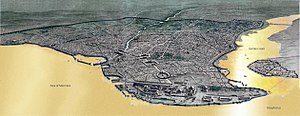330
Appearance
(Redirected from 330 AD)
This article relies largely or entirely on a single source. (February 2024) |
| Millennium: | 1st millennium |
|---|---|
| Centuries: | |
| Decades: | |
| Years: |
| 330 by topic |
|---|
| Leaders |
| Categories |
| Gregorian calendar | 330 CCCXXX |
| Ab urbe condita | 1083 |
| Assyrian calendar | 5080 |
| Balinese saka calendar | 251–252 |
| Bengali calendar | −264 – −263 |
| Berber calendar | 1280 |
| Buddhist calendar | 874 |
| Burmese calendar | −308 |
| Byzantine calendar | 5838–5839 |
| Chinese calendar | 己丑年 (Earth Ox) 3027 or 2820 — to — 庚寅年 (Metal Tiger) 3028 or 2821 |
| Coptic calendar | 46–47 |
| Discordian calendar | 1496 |
| Ethiopian calendar | 322–323 |
| Hebrew calendar | 4090–4091 |
| Hindu calendars | |
| - Vikram Samvat | 386–387 |
| - Shaka Samvat | 251–252 |
| - Kali Yuga | 3430–3431 |
| Holocene calendar | 10330 |
| Iranian calendar | 292 BP – 291 BP |
| Islamic calendar | 301 BH – 300 BH |
| Javanese calendar | 211–212 |
| Julian calendar | 330 CCCXXX |
| Korean calendar | 2663 |
| Minguo calendar | 1582 before ROC 民前1582年 |
| Nanakshahi calendar | −1138 |
| Seleucid era | 641/642 AG |
| Thai solar calendar | 872–873 |
| Tibetan calendar | 阴土牛年 (female Earth-Ox) 456 or 75 or −697 — to — 阳金虎年 (male Iron-Tiger) 457 or 76 or −696 |

Year 330 (CCCXXX) was a common year starting on Thursday of the Julian calendar. At the time, it was known as the Year of the Consulship of Gallicanus and Tullianus (or, less frequently, year 1083 Ab urbe condita). The denomination 330 for this year has been used since the early medieval period, when the Anno Domini calendar era became the prevalent method in Europe for naming years.
Events
[edit]By place
[edit]Roman Empire
[edit]- May 11 – Emperor Constantine the Great dedicates the Column of Constantine and Constantinople,[1] or Nova Roma (modern-day Istanbul). He had spent four years expanding the city of Byzantium, having chosen the site for its strategic location on the Bosporus. The city is later the capital of the Eastern Roman Empire.
- The Goths devastate the city of Tanais, in the Don River Delta.
Africa
[edit]- Ezana, king of Axum, extends his area of control to the west. He defeats the Nobates, and destroys the kingdom of Meroë.
By topic
[edit]Religion
[edit]- Frumentius is the first bishop of Ethiopia (approximate date).
- Eustathius, Patriarch of Antioch, is banished to Trajanopolis.
- The Bible is translated into the Gothic language by Wulfila.
- Pagan temples begin to be progressively abandoned, destroyed or left to fall into disrepair, save those that are transformed into churches.
Births
[edit]- Basil the Great, bishop of Caesarea Mazaca (d. 379)
- Macrina the Younger, Christian nun and saint (d. 379)
- Moses the Black, Christian monk and priest (d. 405)
- Victricius of Rouen, Christian missionary and bishop
- Yang Xi, Chinese scholar and calligrapher (d. 386)
Deaths
[edit]


- Achillius of Larissa (or Achilles), Greek bishop
- Arnobius, Numidian apologist and writer
- Guo Mo, Chinese general and warlord
- Helena (Augusta), mother of Constantine I
- Tiridates III ("the Great"), king of Armenia
- Vicinius of Sarsina, Italian Christian bishop
- Zu Yue, Chinese general and warlord
References
[edit]- ^ "Constantinople" in The Oxford Dictionary of Byzantium, Oxford University Press, Oxford, 1991, p. 508. ISBN 0-19-504652-8
